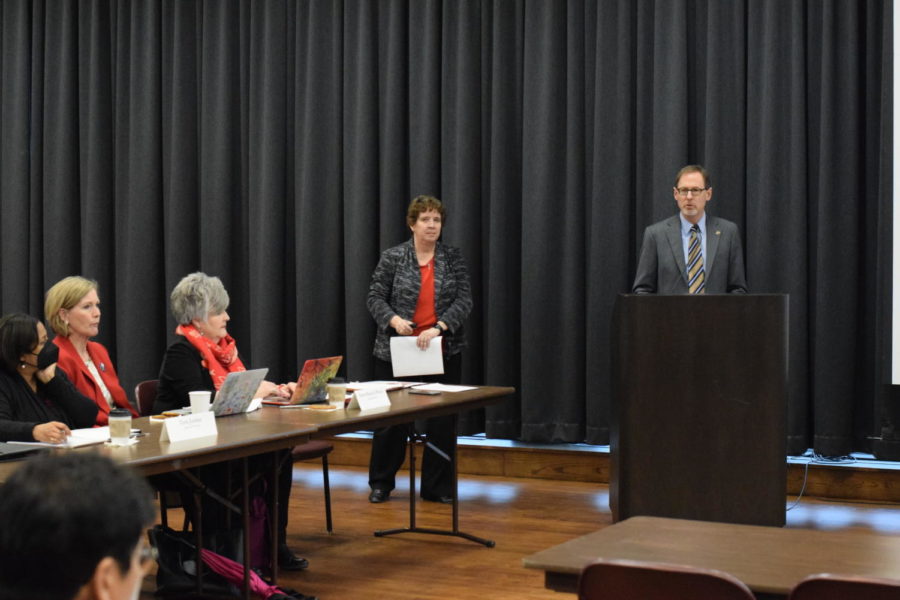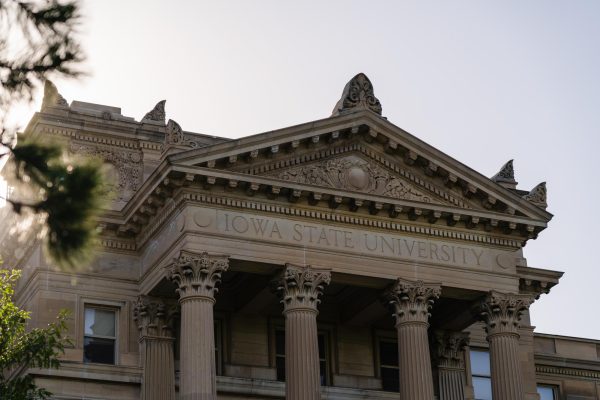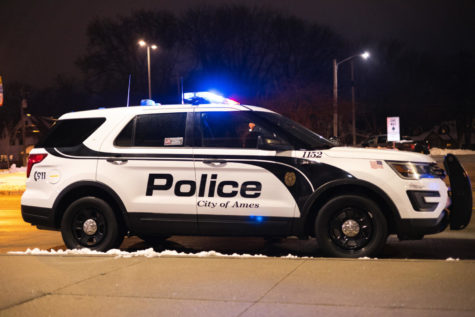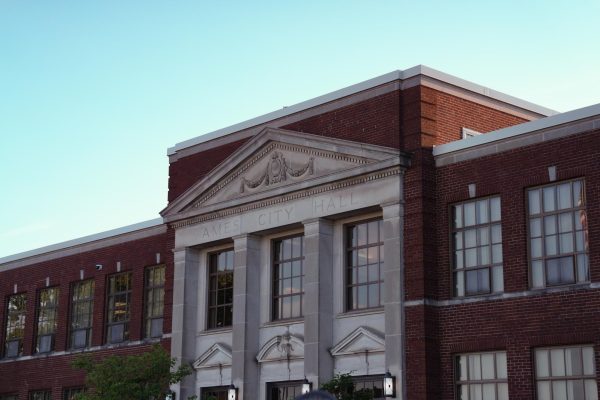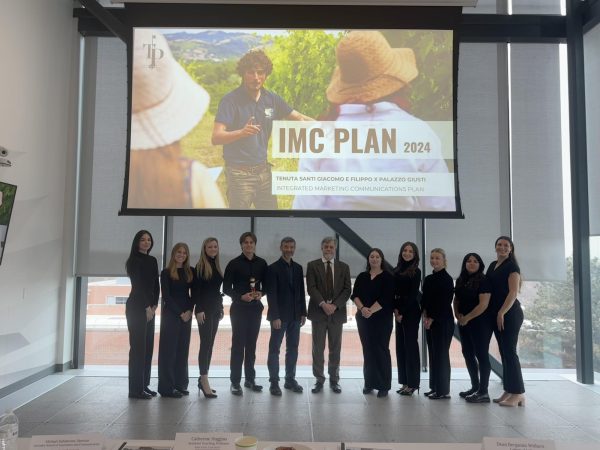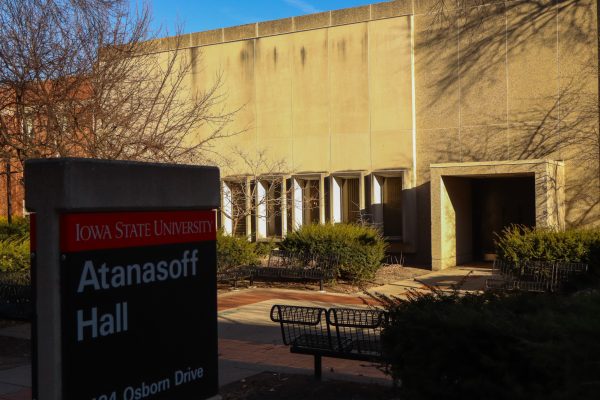Faculty Senate’s numbers dwindle as catalog freeze takes effect
Senior Vice President and Provost Jonathon Wickert pictured standing at the podium during his presentation on Iowa State’s proposed list of peer institutions as Director of Institutional Research Karen Zunkel stands by.
The Faculty Senate barely reached its quorum for its February meeting Tuesday afternoon, nearly illegitimizing the consensus of the group in attendance.
Made up of 82 members, the senate must have at least 42 members in attendance in order to reach their quorum. During Tuesday’s meeting, only the minimum of members were in attendance, allowing the senate to approve their consent agenda.
One cause for the low attendance was the lack of unfinished or new business on the agenda according to Robert Wallace, associate professor in ecology, evolution and organismal biology. This is partially due to the fact that the university has frozen the course catalog and no changes will be made to the catalog until February 2024.
“Given the catalog freeze, I’m not expecting as much to come through as we might normally have,” said Faculty Senate President Jon Perkins, an associate professor in accounting. “But please, I was a little nervous with the attendance. If we don’t have as much I’ll try to bring in some value-added presentations as well.”
The senate heard a report from Senior Vice President and Provost Jonathon Wickert and Executive Director of Institutional Research Karen Zunkel regarding Iowa State’s proposed list of peer institutions.
Wickert said the Board of Regents charged the three universities with refreshing their lists during fall 2022. He said the regents use the universities’ list of peer institutions to benchmark the performance of each school. He said each university has a list of peer institutions customized to its specific mission and specializations.
Wickert said Iowa State’s list has only been updated once since 1986.
Wickert said the current list of peer institutions only includes one institution which considers Iowa State a peer. He said most are larger and more selective than Iowa State and have human medical schools.
Zunkel outlined the quantitative and qualitative values the advisory committee looked at when deciding on what institutions to include in the new list of peer institutions.
“I started about looking at who’s very high research R1 public land grant, that was kind of our starting point,” Zunkel said.
Zunkel said from there, the committee narrowed down the list to cut out institutions that are not comparable in size, scale or in the missions they serve.
“We narrowed it down to a list of 24 that we thought would be reasonable peers,” Zunkel said. “We took that list and looked at a wide variety of data sources.”
Zunkel said they looked at a variety of objective pieces of information like graduation rates, ACT scores and faculty staff sizes.
“So we went through that process, but the numbers are only part of it, because if you look at the data– we aren’t just numbers of data points,” Zunkel said. “We have missions. How do we compare the other institutions to what they profess to be what they aspire to be?”
Zunkel said with consideration of the qualitative and quantitative data, the committee came up with a list of ten universities to be listed as Iowa State’s peer institutions.
Wickert then revealed the new list of peer institutions, which included:
Michigan State University
North Carolina State University
Purdue University
Colorado State University
Kansas State University
Oklahoma State University
Oregon State University
University of Missouri
University of Nebraska
Virginia Tech University
Wickert said of the ten universities which are on the new list, only Michigan State, North Carolina State and Purdue were included in the previous list. Unlike the old list, eight of the universities list Iowa State as a peer institution.
“The new peers also have a mix of representing border states and also representing some geographic diversity, sort of coast to coast,” Wickert said. “It also recognizes institutions that we’re, roughly speaking, going to be competing against for students […] and also for faculty talent when we recruit people.”
Wickert also said when compared to other universities on the list, Iowa State is the most affordable and efficient of its proposed peer institutions.
Wickert said he was happy with the way the list turned out because no matter how the committee framed the metrics and weighted the various qualities of the universities included, it came out relatively similar.
“The order might change a little bit,” Wickert said. “Depending on how you would use the metric […] you might lose one or another one might swap in from that list of 24, but roughly speaking, it would stay the same which made us feel like we had a robust list that was not sensitive to the actual methodology that had been used.”
During his announcements at the end of the meeting, Wickert made a statement to acknowledge the earthquake that took place in Turkey and Syria earlier in February.
“We have a number of students, faculty colleagues here on campus … and I know you, like me, are keeping them in your thoughts at this time,” Wickert said. “[We] appreciate any flexibility that you’re able to offer your colleagues and students from Turkey and Syria as they and their families work through this situation.”
Associate Professor in Supply Chain Management Meltem Denizel, who is from Turkey, stood after Wickert’s comments to thank him for his acknowledgment of the earthquake.
“I just want to tell you that I appreciate your concerns about the earthquake that really shaped that part of the world,” Denizel said. “It was really devastating. And even though people don’t live in that part of the country, not all of us, we feel that very deeply and we have been thinking about this for the last week.”
Wickert also touched on the shooting which took place at Michigan State University Feb. 13.
“We all have good colleagues in East Lansing, and they are likewise in our thoughts, and I’m sure the Faculty Senate’s thoughts, at this point.” Wickert said. “Really for the entire MSU campus and their students and very broad community.”
Your donation will support the student journalists of the Iowa State Daily. Your contribution will allow us to purchase equipment, send our student journalists to conferences and off-set their cost of living so they can continue to do best-in-the-nation work at the Iowa State Daily.


